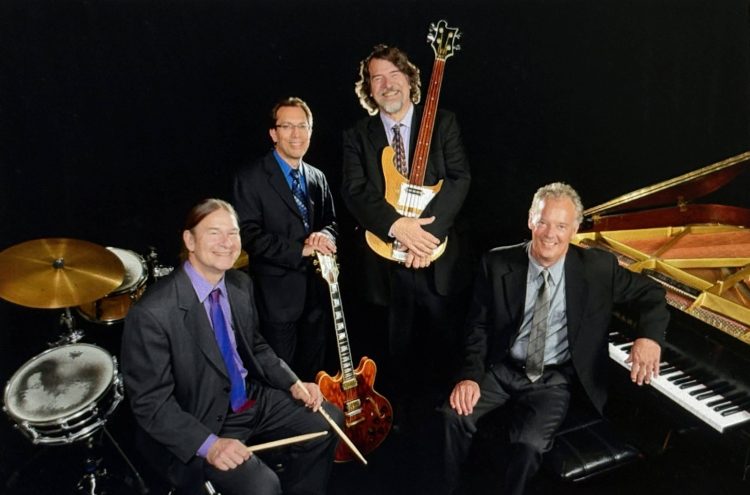On my watch – The Luck of Being at the Berkley for the Brubeck Brothers Jazz Concert

By Anne W. Semmes
It was the moment when the Brubeck brothers – Chris on bass and Dan on drums, plus pianist Chuck Lamb and guitarist Mike DeMicco, began playing that Dave Brubeck masterpiece “Blue Rondo a la Turk” with its unforgettable melodic begin and blend of jazz and blues, that I broke down in tears, overwhelmed with memories of growing up listening to that piece in my big sister and brother-in-law’s house in Memphis, Tennessee. Moved as I was, also spellbound was the often-clapping audience of nearly 300 filling to capacity the Greenwich Library’s Berkley Theater nearly a month ago on a Sunday afternoon, July 27.
Chris, who towers over all, gave a captivating history of that Blue Rondo piece beginning in 1958, “when we had a really jazzy beatnik president named Dwight Eisenhower who believed in this thing called Voice of America, a fantastic thing [recently removed] that would broadcast American news as opposed to Communist party news, interlacing lots of jazz…which behind the Iron Curtain jazz was so popular.” So, “the Eisenhower Administration said, let’s send goodwill ambassadors, American jazz musicians all over. And it really worked because in jazz, there’s such democracy.”
“We have four equal voices in this band,” Chris noted, “and each person has a right to speak… And we found as we’ve traveled the world, the more oppressed people are, the more that society loves jazz – it is incredible.”
Brubeck as jazz ambassador
Dave Brubeck, as a designated ambassador, then traveled Europe – first with wife Iola and a couple of sons of their six kids, but arriving in the Middle East on their way to Iran and Iraq they learned “no women or children were allowed.” It would be at Dave’s tour end in Turkey, “the most sane democratic place,” when walking its streets to a recording studio for a radio broadcast with Turkish musicians that the magical spark came that brought us Blue Rondo a la Turk. “He heard some musicians hanging out, playing on the street,” told Chris.” And for a “cowboy” growing up in Northern California, “he was not used to hearing exotic music in that culture.” Chris turned to Dan to hit his drum to play that exotic beat of 1-2-1-2-1-2-1-2-3 that Dave had heard.
“Dad put a melody to that same fascinating rhythm, then he borrowed the rondo form from classical music.” But where was the jazz? So, he chose to “throw some blues in because everyone knows that 9/8 alternating the blues and the rondo form will make sense. And the song became a hit.”
The mind jumps to a similar creative aha moment recently learned of Geroge Gershwin when he was traveling the streets of Paris whilst composing his “An American in Paris.” He hears the honking taxis, then collects a few of those taxi horns. Thus, that traffic sound would begin his masterpiece, “An American in Paris.”
Indeed, this is what Darius Milhaud, the influential French composer/teacher of Dave Brubeck would recommend: “Whenever you travel the world, really listen and you can incorporate new ideas from other cultures and bring them into jazz.” (And Darius became the name of the first of Brubeck’s five sons.) Milhaud was teaching at Mills College in San Francisco where Dave studied, and at their first meet up had asked, “Why do you want to study with me?” “Because you know all about orchestration and voicing and chorus, and I have this dream someday I can write big pieces if I study with somebody who knows and writes the coolest music in the world,” Chris told. Milhaud’s response: “Oh, me and my French friends, we all think music is dead. What we like is American jazz.”
The Brubeck brothers – and sister
Chris and brother Dan are surely inheritors of their father’s musical talents. Peterson Music Librarian Dora Salm, in her introduction had described the brothers as “known for their creative improvisation and adventurous rhythms.” It was in 1972 that Chris joined his father and brothers Darius and Dan to form the New Brubeck Quartet. Chris would later form the Brubeck Brothers Quartet. And just two years ago Chris debuted his composition, “Confluence: Double Concerto for Classical Guitar, Blues Guitar & Orchestra,” with the Memphis Symphony Orchestra!
In the concert Chris would shine the light on drummer brother Dan, describing him with a smile as “quietly playing behind me on brushes.” Throughout the concert Dan would display his tireless and dynamic talent addressing his multiple drums, often bringing applause.
Time came to address their sister, Cathy, playing a piece named for her called “Kathy’s Waltz,” [a historic spelling error by Columbia Records] “Our sister Cathy was obsessed with becoming a ballet dancer where she would, four years old, wear a little tutu costume and twirl across…So my dad wrote a song for her that became, of all the songs written for the various children, the most famous one because it was on the ‘Time Out’ record…And as you’ll hear, this is an amazingly beautiful tune.”
Brubecks play at Christ Church Greenwich
Then it was segue time into a different genre. “Some of you know,” said Chris, “my father, in addition to writing over 600 jazz tunes, also wrote a lot of choral and religious music. And one of the earliest performances was right here in Christ Church Greenwich. A man named Richard Vogt had a good choir [Greenwich Choral Society] and the piece was ‘La Fiesta De La Posada.’ It was Dave’s and my mom’s take on the famous story of Joseph and Mary searching for a place to stay, and they end up in the manger.”
“It was really fun for us every Christmas,” he continued, “because there would not only be kids, but three wise men, who looked a bit like the ‘Three Amigos’… and they had a virgin, a very beautiful soprano.” But Dave’s first religious piece came soon after serving in WWII.
“It was called ‘The Light in the Wilderness,’” said Chris. “Dad couldn’t believe [in the War] how many people that theoretically all believed in the teachings of Jesus Christ were slaughtering each other in Europe and just destroying everything. So, he said, ‘I’m going to write a piece that makes everyone think about those words.’ So, one of the movements is called ‘Forty Days’ of how Jesus went out 40 days in the desert…So, here’s a meditation on that piece.”
After an hour and a half of their electric performance Chris offered one last piece – audience choice. “Take Five!” shouted the hundreds for that piece known round the world. It played out with Chuck Lamb pounding the keys – leading the tune, with Mike DeMicco plucking furiously on his guitar, Chris on his trombone, and Dan giving those drums all he’s got. The standup applause was long.
So, this reporter was fortunate over the years to be there for Dave Brubeck performances and now with the Brubeck Brothers. I also experienced “La Fiesta De La Posada” performed in Christ Church Greenwich years ago. But alas I’ve not witnessed “The Light in the Wilderness.” One can only hope the Brubeck Brothers, now in their 70’s, will hang onto their impressive stamina, and return one day to Greenwich with their fascinating history and exhilarating rhythmic jazz.




